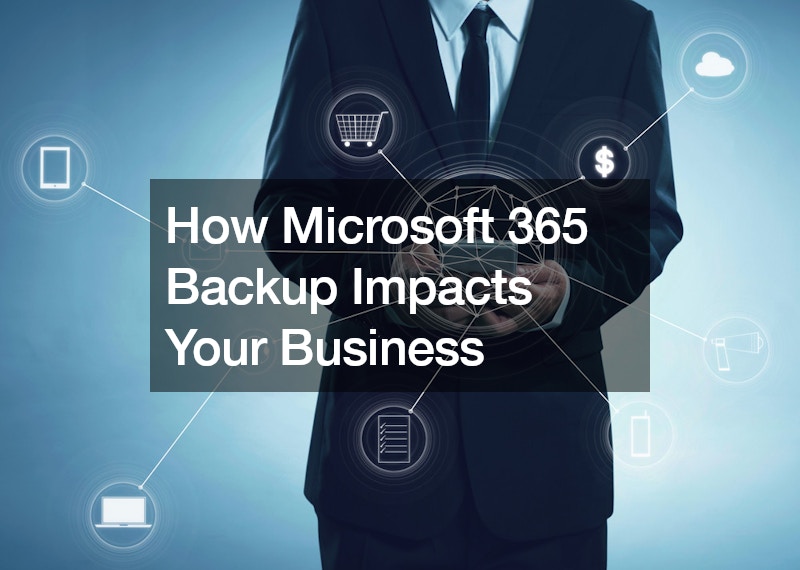
If you own or operate a business, it doesn’t matter what type of business it is, how large or small your company is, or what industry you work in, because having a business continuity plan isn’t optional. From your emergency response and financial safety protocols to restoring backup files, when a crisis hits, it is your business continuity plan that will keep you afloat until the storm passes. That is also one major issue, as shown in the attached video, that the Microsoft 365 backup system can also address. The truth is, there isn’t a single business in operation today that can afford to lose its customer data, financial history, inventory details, or any number of vital files or integral operational information.
These are reasons why businesses invest in safety net options like Microsoft 365 backup and other solutions to protect their companies from catastrophe. No, the chances of having a cyberattack that eradicates all your company files aren’t great, but the threat is viable. The real question is, can your company not afford to invest in a backup plan if disaster strikes? Fortunately, with options like Microsoft software, companies never have to find out, and that is what backup systems are all about.
Cloud Storage Fundamentals
Cloud storage fundamentals encompass the core concepts that underpin the storage of data in the cloud. In the context of the summary provided, understanding these fundamentals is crucial for comprehending cloud-based backup solutions such as Microsoft 365 backup.
Cloud storage involves storing data on remote servers accessed via the internet, providing scalability, accessibility, and redundancy. This ensures that data remains available even in the event of hardware failure or other disruptions. Key aspects of cloud storage include distinguishing between ephemeral and persistent storage. Ephemeral storage is temporary and tied to a specific instance, while persistent storage retains data even after the instance is terminated.
Furthermore, knowledge of different storage types such as block, file, and object storage is essential. Each type serves distinct purposes and is suited for various applications. Understanding these fundamentals lays the groundwork for effectively leveraging cloud storage solutions like Microsoft 365 backup to safeguard data and ensure business continuity.
Types of Persistent Storage
Understanding the types of persistent storage is essential for grasping how data is securely retained in cloud-based environments. Persistent storage refers to storage solutions that maintain data integrity even after the associated instance or server is terminated.
The importance of persistent storage in cloud backup solutions emphasizes its role in safeguarding critical data. Different types of persistent storage include block, file, and object storage. Block storage involves storing data in fixed-size blocks, making it ideal for applications that require high-performance and low-latency access.
File storage allows users to organize data in a hierarchical structure, facilitating easy sharing and collaboration. Object storage, on the other hand, stores data as objects within containers or buckets, making it suitable for scalable and cost-effective storage of unstructured data like documents, images, and videos.
Understanding these types of persistent storage enables organizations to choose the most appropriate solution for their backup and data retention needs within the Microsoft 365 ecosystem.
Billing and Performance Considerations
Billing and performance considerations play a crucial role in backup solutions, as highlighted in the summary. When selecting a backup solution, organizations must weigh the cost implications against performance requirements to ensure optimal efficiency and cost-effectiveness.
In terms of billing, organizations must understand the pricing models offered by Microsoft 365 backup providers, which may include factors such as storage capacity, data transfer, and access frequency. By carefully analyzing these pricing metrics, organizations can align their backup strategy with their budgetary constraints.
Performance considerations involve evaluating the speed, reliability, and scalability of the backup solution. Factors such as backup and restore times, data transfer rates, and data access latency are essential aspects to consider. Organizations must choose a backup solution that meets their performance requirements without compromising on data integrity or accessibility.
By carefully considering both billing and performance aspects, organizations can select a backup solution that strikes the right balance between cost efficiency and operational effectiveness.
Consumer Cloud Storage Solutions
Consumer cloud storage solutions offer individuals a convenient way to store, access, and share their digital content across multiple devices. These solutions, exemplified by platforms like iCloud, OneDrive, Dropbox, and Google Drive, provide users with a user-friendly interface to upload, organize, and retrieve files, photos, videos, and documents from any internet-connected device.
Consumer cloud storage solutions typically offer a range of storage plans, allowing users to select the amount of storage space that meets their needs. Users can access their stored data from various devices, including smartphones, tablets, laptops, and desktop computers, ensuring seamless synchronization and accessibility.
.

